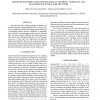Free Online Productivity Tools
i2Speak
i2Symbol
i2OCR
iTex2Img
iWeb2Print
iWeb2Shot
i2Type
iPdf2Split
iPdf2Merge
i2Bopomofo
i2Arabic
i2Style
i2Image
i2PDF
iLatex2Rtf
Sci2ools
106
click to vote
ICIP
2001
IEEE
2001
IEEE
Minimum discrimination information clustering: modeling and quantization with Gauss mixtures
Gauss mixtures have gained popularity in statistics and statistical signal processing applications for a variety of reasons, including their ability to well approximatea large class of interesting densities and the availability of algorithms such as EM for constructing the models based on observed data. We here consider a different motivation and framework based on the information theoretic view of Gaussian sources as a "worst case" for compression developed by Sakrison and Lapidoth. This provides an approach for clustering Gauss mixture models using a minimum discrimination distortion measure and provides the intuitive support that good modeling is equivalent to good compression.
Gauss Mixture Models | Gauss Mixtures | ICIP 2001 | Image Processing | Minimum Discrimination Distortion |
| Added | 25 Oct 2009 |
| Updated | 25 Oct 2009 |
| Type | Conference |
| Year | 2001 |
| Where | ICIP |
| Authors | Robert M. Gray, John C. Young, Anuradha K. Aiyer |
Comments (0)

